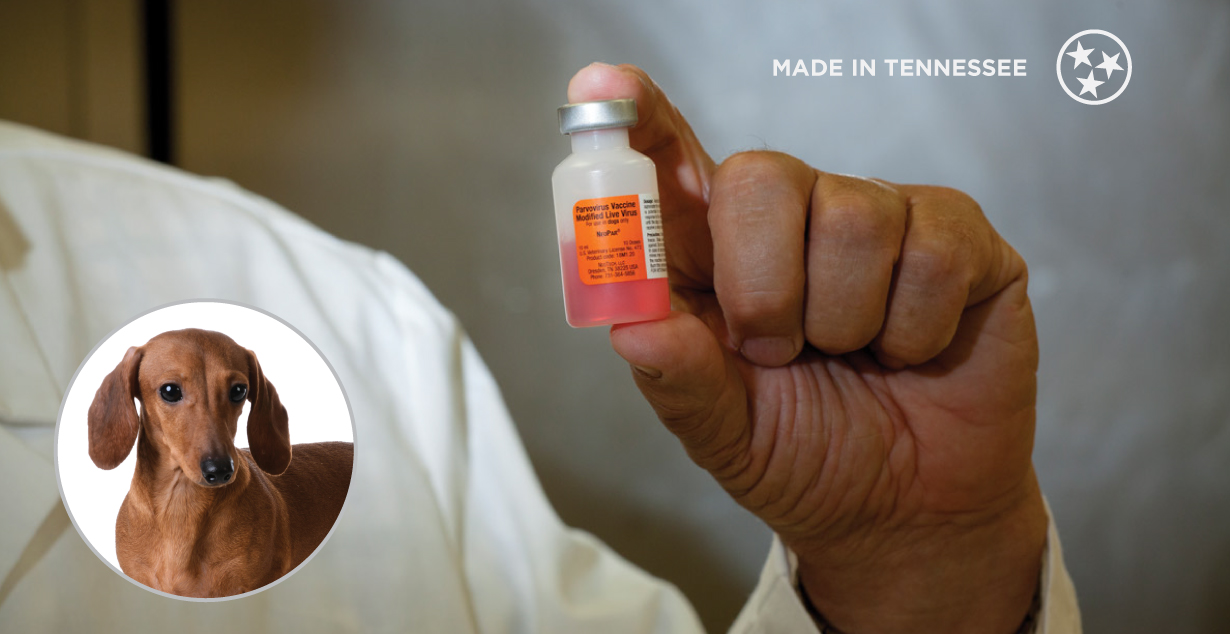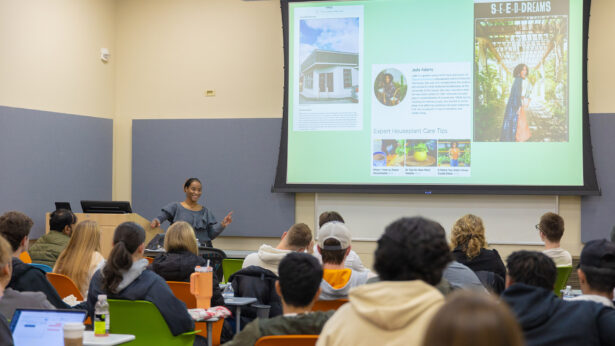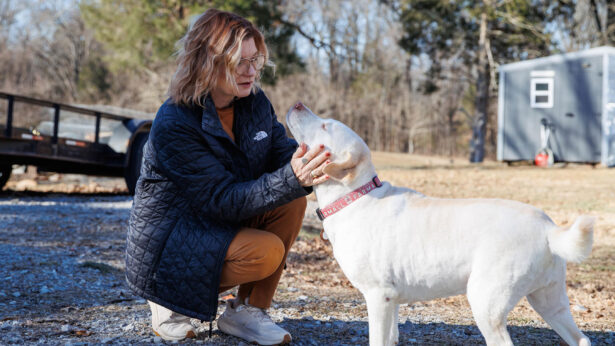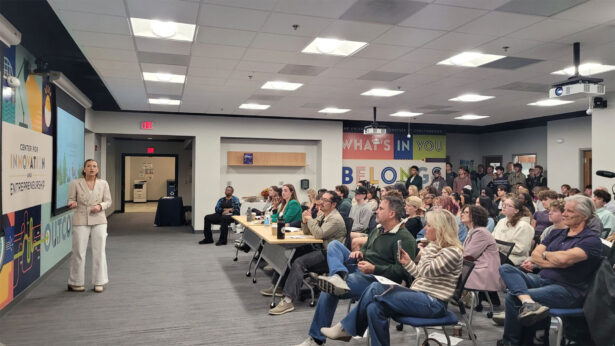By Erin Chesnut Photos by Nathan Morgan
Bob Page didn’t come to the University of Tennessee at Martin to attend veterinary school; he came to be a farmer. Luckily for the canine community, he changed his mind.
The year 1979 was a bad time to be a dog. Tens of thousands of dogs and puppies lost their lives in a nationwide epidemic of parvovirus—a gastrointestinal disease largely targeting young puppies. Veterinarians across the country, including Page (Martin, ’69), were losing almost every infected dog they saw, with no treatment in sight.
But Page helped change all that.
In addition to his veterinary clinic, Page is the owner and operator of NEOTECH, a vaccine company housed in an unassuming building in Dresden, Tennessee, where the NEOPAR® vaccine is made. NEOPAR® was the first vaccine created to prevent parvovirus in dogs and is still considered the gold standard among parvovirus vaccines.
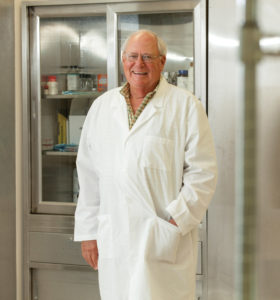
John Black, a microbiologist for the state of Tennessee, developed the first vaccine solution to combat the parvovirus epidemic.
“He was the brains behind (the vaccine), but we worked together to develop it and grow the virus and get it into a vaccine and get it sold,” Page says. “We’ve made some minor modifications to it over the years, but it’s still the most effective vaccine (for parvovirus).”
The original formula was tested and sold through Page’s vaccine company, which primarily produced vaccines for hogs and livestock. When federal licensing became a requirement in 1990, however, the laboratory began exclusively producing the parvovirus vaccine, which is now available to the public and veterinary professionals alike.
“We’re a small company; we have a niche market…Our focus is mainly on the breeding industry,” Page explains. “You’ve got to get into early life to prevent this disease…Once it (parvovirus) gets into a kennel, for a producer, it’s devastating. It can bankrupt a producer.”
Page, raised on a sharecropping farm in Trimble, Tennessee, says the switch from farming to vaccine production wasn’t as difficult as some may think.
“Vaccine production really parallels tremendously to farming. They ask me why I went from agriculture to growing a vaccine, but in very simple terms, you’re growing a crop,” he says. “You take a very small amount of the master virus and plant it into the growth media in an environment where the virus grows and reproduces into a large amount, and that’s what you put into the vaccine.”
For a vaccine to be effective, Page explains, it must help the dog’s immune system produce antibodies without making the dog sick.
“You don’t want a disease virus out there giving (parvovirus) to the animals, so one of the steps you take is to turn the diseased virus into an attenuated virus so it does not cause disease. It’s a different virus. You change the structure and the nature of the virus … but you maintain the basic properties,” he says.
The new virus is then isolated and tested to make sure it is pure and stable. This master seed is then multiplied and used to create the final vaccine product.
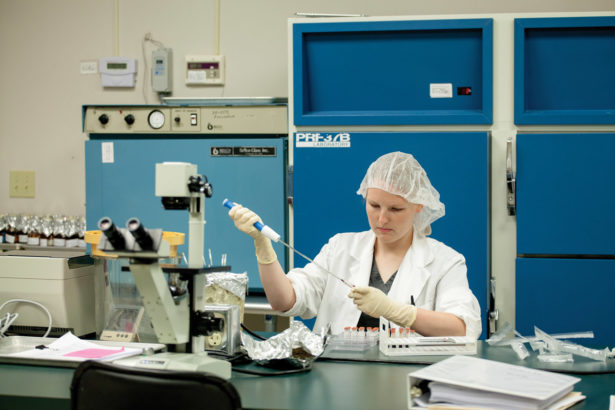
NEOTECH may be a small operation, but the facility still tests some of its vaccine on-site.
“Each lot of the vaccine is required to be tested in animals, mainly for safety purposes and to test for adverse effects,” Page says. “We make sure our vaccine hasn’t been contaminated by other vaccines or bacteria or molds, and all of that is verified by the government. Then we do have a limited number of test animals which receive the vaccine and are observed for a period of time to make sure there are no adverse reactions.”
NEOTECH’s vaccines also are tested independently by outside research facilities to ensure a final product with the highest possible quality and effectiveness.
In addition to NEOPAR®, Page’s laboratory also produces a vaccine to combat canine distemper, a contagious disease with no known cure. Distemper attacks a dog’s gastrointestinal, respiratory and nervous systems, and animals unlucky enough to contract the disease must be euthanized. Ferrets, which are common as pets and laboratory animals, also are carriers of this deadly virus. Page’s facility is working to develop a version of its distemper vaccine especially for ferrets to help slow the disease’s spread. These vaccines do not cure the virus but have been proven to be effective preventive measures.
Page doesn’t do all this work alone, and his five-person team has strong UT Martin ties. Ben Hatler (’99) is in charge of laboratory operations and focuses largely on production and sales. Heather Hollis (’01) is in charge of quality control, and Tiffany Browning (’14) serves as the facility’s administrative assistant and helps manage the never-ending flow of government paperwork associated with the industry. Bob Edwards, a microbiologist from Texas, has worked with Page since joining the NEOTECH staff in 1998, and Robert “Tex” Walker oversees vaccine and virus production.
Hatler and Hollis first began working with Page while students at UT Martin. Hatler originally intended to pursue a veterinary career but changed his focus to research after helping Page with vaccine production. After earning master’s and doctoral degrees from the University of Kentucky, he returned to where it all started.
“I came back (to NEOTECH) because of Dr. Page. He was good to me my entire years at UTM. He gave me plenty of opportunities to work and always had lots of good advice,” says Hatler. “I knew I would be able to do things at NEOTECH that I might not be able to do at other places because I had that personal relationship with him.”
While each team member is responsible for a particular area of vaccine production and distribution, Page says every vaccine batch is a team effort. Tasks become interchangeable over time, and each staff member must have an understanding of the jobs performed in other areas to keep production running smoothly.
Page also hires UT Martin students for part-time work, and he says he enjoys helping them gain experience prior to graduation. He trusts the university as a source of high-quality student workers with the skills to get the job done.
“We’re close at hand to UT Martin, and it’s been a very good relationship over the years. We’ve hired students from different courses of study—pre-vet students, animal (health) technology students, education majors—that have worked for us. It’s been a good resource for us to use,”
he says.
While Page and his team focus on providing benefits to dogs and other animals, their products have had surprising effects on human health, as well. In NEOPAR’s® early years, parvovirus began attacking the dogs used at a certain medical facility developing a drug to treat breast cancer.
“(They were) producing a particular bloodline of dogs to fit certain parameters to fit the medical study. Parvo got into this facility, and they were losing more than 60 percent of their dogs to parvo—nothing could control it. The study was going to be scratched because they couldn’t produce the dogs needed to continue,” Page explains. “We were able to control parvo in that facility, so they had enough dogs to continue the study. Their drug was approved and has been one of the major breakthrough medications for breast cancer in humans.
“There’s more than just the dogs and the pet business,” Page says. “It (the vaccine) can be far-reaching, and we had an indirect part in that. But I think we did play a hand in it. … At the time we were just interested in the dogs, but there was a bigger outcome. Had our vaccine not been effective and had we not been able to control that outbreak, that study would have been scratched. They would have lost all that progression.”
“It’s more than just that the vaccine that helps save puppies’ lives,” Hatler says. “It also provides people with a source of income because, if the vaccine wasn’t favorable, then breeders wouldn’t be able to raise puppies and provide people with family pets. It also helps in shelter situations where those dogs are at high risk of contracting parvovirus. We help minimize that risk and allow those dogs to be placed in good homes.”
Page and his NEOTECH team help dogs and puppies stay healthy, enabling the animals to have happy lives by finding loving families with whom to live out their years. Millions of wet noses, wagging tails and puppy kisses have been made possible as Page and his team continue to save lives across the country—one vaccination at a time.
